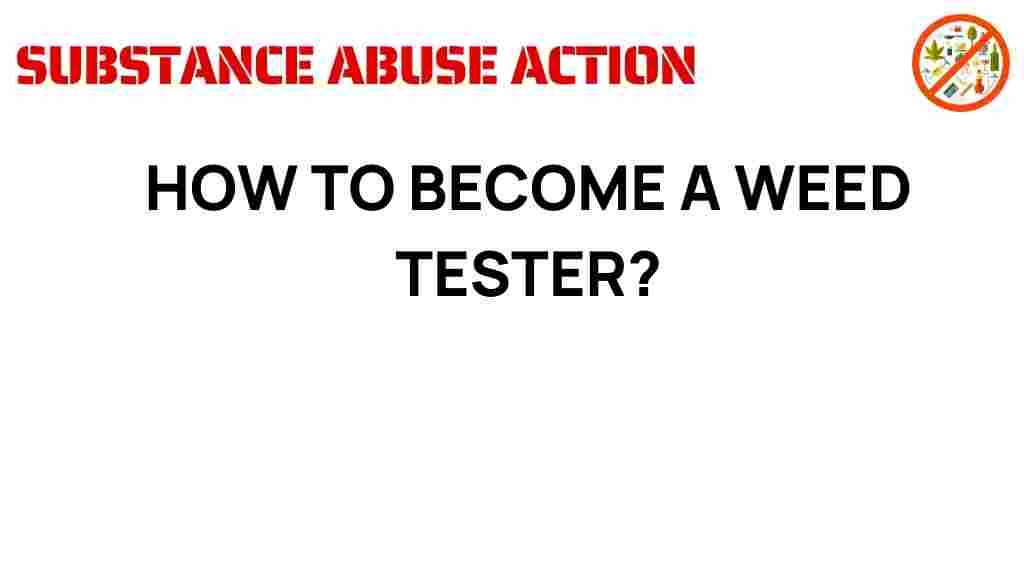Uncovering the Secrets: How to Become a Weed Tester in Today’s Market
The cannabis industry has seen a remarkable transformation over the past few years, leading to an increased demand for professionals who can ensure the quality and safety of cannabis products. One such role that has emerged is that of a weed tester. This article will guide you through the essential steps to becoming a weed tester, exploring job opportunities, professional growth, testing methods, quality control, cannabis regulations, and the career path you can expect in this exciting field.
Understanding the Role of a Weed Tester
A weed tester plays a crucial role in the cannabis industry by analyzing cannabis products to ensure they meet safety and quality standards. This involves various testing methods aimed at identifying the potency, contaminants, and overall quality of the product. With the rise of legal cannabis markets, the demand for skilled testers has skyrocketed, opening up numerous job opportunities.
Key Responsibilities of a Weed Tester
- Conducting laboratory analyses of cannabis samples.
- Testing for cannabinoid potency, terpenes, and contaminants.
- Ensuring compliance with local and federal cannabis regulations.
- Documenting results and maintaining accurate records.
- Collaborating with growers, manufacturers, and retailers.
Essential Qualifications and Skills
To become a successful weed tester, you need a combination of education, skills, and experience. Here’s what you typically need:
Educational Background
Most weed testers hold at least a bachelor’s degree in a relevant field, such as:
- Chemistry
- Biology
- Pharmaceutical sciences
- Environmental science
Technical Skills
In addition to formal education, the following technical skills are important:
- Knowledge of laboratory testing methods.
- Proficiency in using analytical instruments such as HPLC and GC-MS.
- Understanding of quality control processes.
- Familiarity with cannabis regulations and compliance standards.
Step-by-Step Process to Become a Weed Tester
If you’re interested in pursuing a career as a weed tester, follow these steps:
Step 1: Obtain Relevant Education
Your journey begins with obtaining a degree in a relevant scientific field. This foundational knowledge is essential for understanding the complexities of cannabis testing.
Step 2: Gain Laboratory Experience
After your degree, seek internships or positions in laboratories where you can gain hands-on experience with testing methods commonly used in the cannabis industry.
Step 3: Get Certified
Consider obtaining certifications that enhance your credibility as a weed tester. Certifications in laboratory testing and cannabis-specific programs can significantly boost your employability.
Step 4: Understand Cannabis Regulations
Familiarize yourself with the local and federal regulations regarding cannabis testing. This knowledge is crucial for ensuring compliance and quality control in your testing processes.
Step 5: Network in the Cannabis Industry
Join professional organizations and attend industry events to meet others in the field. Networking can lead to job opportunities and professional growth.
Testing Methods Used by Weed Testers
As a weed tester, you’ll use various testing methods to evaluate cannabis products. Here are some of the most common:
1. Cannabinoid Profiling
This method measures the concentration of cannabinoids like THC and CBD in cannabis samples, providing crucial information about the product’s potency.
2. Terpene Analysis
Terpenes contribute to the aroma and flavor of cannabis. Analyzing terpenes can help in understanding the product’s characteristics and effects.
3. Contaminant Testing
Testing for pesticides, heavy metals, and microbial contaminants is critical for ensuring product safety. This testing helps protect consumers from harmful substances.
4. Moisture Analysis
Measuring moisture levels in cannabis products helps prevent mold and degradation, ensuring that products remain safe and effective.
Quality Control in Cannabis Testing
Quality control is a vital aspect of the testing process. Here are some key practices that weed testers should follow:
- Regular calibration of testing equipment.
- Implementing standard operating procedures (SOPs) for testing.
- Participating in proficiency testing programs to benchmark results.
- Maintaining a clean and organized laboratory environment.
The cannabis industry is heavily regulated, and understanding these regulations is essential for any weed tester. Here are some key points to consider:
- Stay updated on local and federal laws regarding cannabis testing.
- Understand the requirements for laboratory accreditation.
- Follow guidelines for sample collection and handling.
- Be familiar with the reporting procedures for test results.
Career Path and Professional Growth
A career as a weed tester offers numerous opportunities for advancement and professional growth. Here’s what you can expect:
Entry-Level Positions
As a new weed tester, you may start in entry-level positions, performing routine testing and analyses under the supervision of experienced professionals.
Mid-Level Roles
With experience, you can transition into mid-level roles, taking on more responsibilities, such as managing testing projects and overseeing junior staff.
Advanced Positions
Eventually, you may move into advanced positions such as laboratory manager or quality control director, where you will be responsible for overall testing operations and compliance.
Troubleshooting Tips for Aspiring Weed Testers
As you embark on your journey to become a weed tester, you may encounter challenges. Here are some troubleshooting tips:
- **Stay Informed:** Keep up with industry trends and regulatory changes to navigate challenges effectively.
- **Seek Mentorship:** Connect with experienced testers who can provide guidance and support.
- **Continuous Education:** Attend workshops and courses to sharpen your skills and knowledge.
- **Practice Patience:** Gaining expertise takes time; don’t rush the learning process.
Conclusion
Becoming a weed tester in today’s booming cannabis industry can be a rewarding career choice. With the right education, experience, and understanding of testing methods and regulations, you can find numerous job opportunities and achieve significant professional growth. Whether you are just starting or looking to advance your career, the path of a weed tester offers a unique chance to contribute to a rapidly evolving field. For more information about careers in cannabis testing, check out this resource. Additionally, for industry standards and regulations, visit the National Cannabis Industry Association.
This article is in the category Support and created by SubstanceAbuseAction Team
